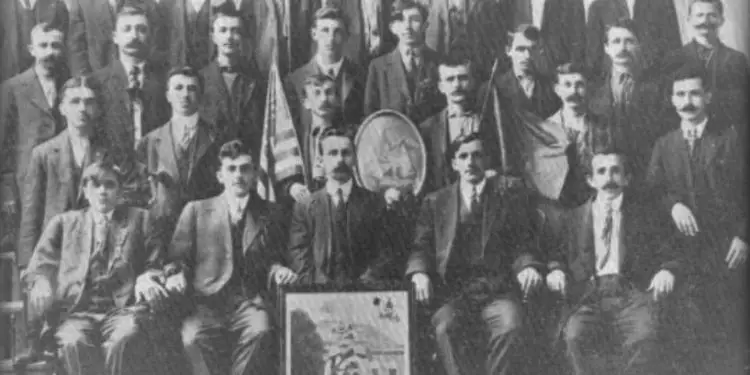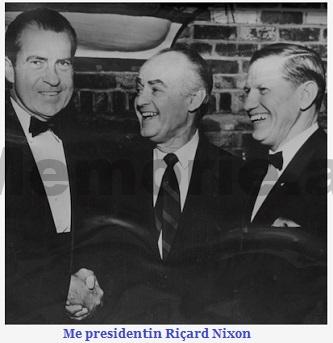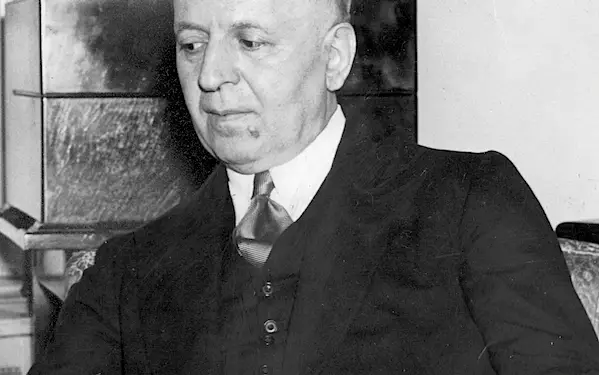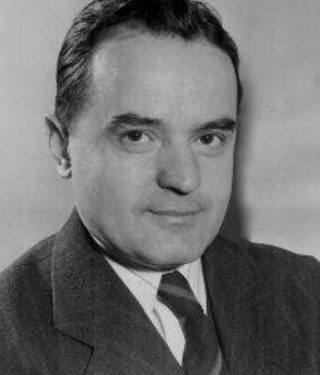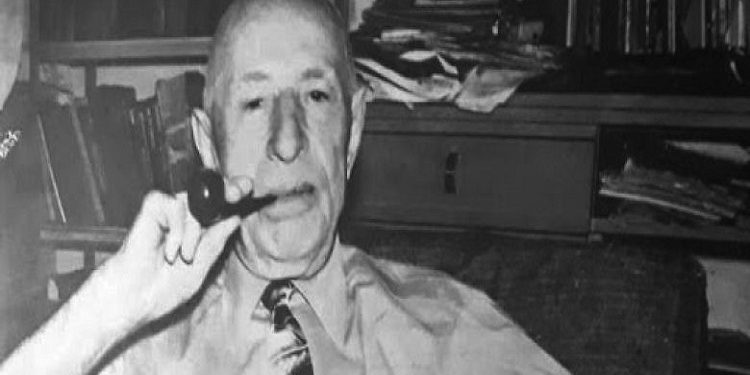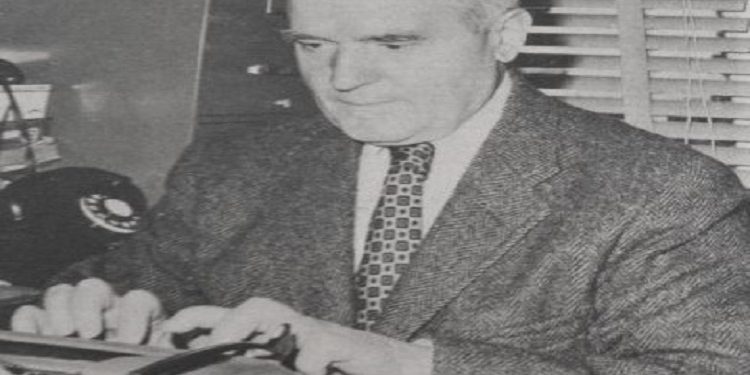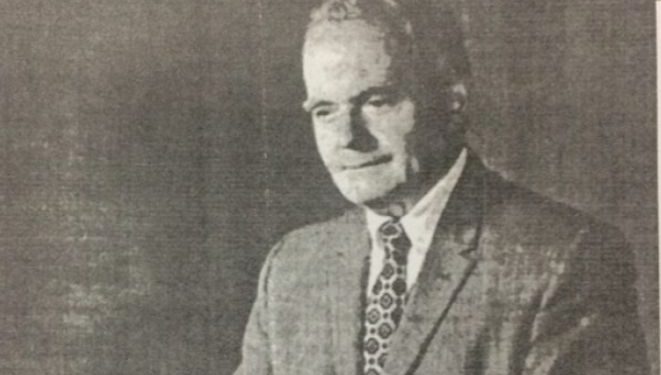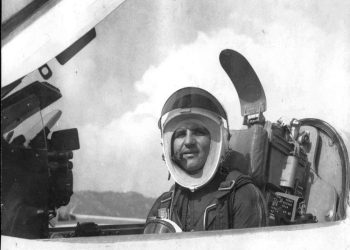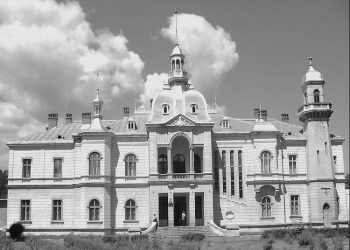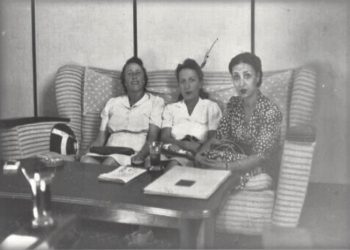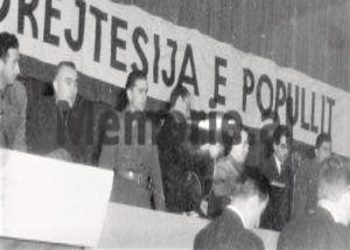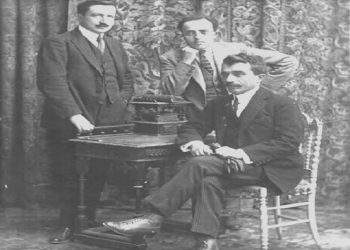From DALIP GREECE
Second part
Memorie.al / Nelo Drizari, the editor of “Dielli” in the years 1937-’39, head of the “Vatra” Society branch for New York in 1928, he was the founder of the Albanian Section of “Voice of America”, he was the journalist of the first Albanian in the USA, a graduate of Columbia University and a professor at that University, secretary of the “Progress” Society and president of the “Albanian Students’ Union in America”. Drizari distinguished himself as a journalist, novelist, linguist, researcher and painter. CV to his, we must add one more fact: Drizari, who was the first to introduce the Albanian language into the school programs of Columbia University, where the former student returned as a lecturer of the Albanian language. In 1934, he to publish the first English-Albanian dictionary and in 1947, the Handbook: ‘Spoken and Written Albanian’.
Continues from last issue
The author of the article defends the actor of Albanian origin from those Albanians who gossiped that he had lost his Albanian identity and did not feel anything for his own race. Nelo objected: “But we cannot say that Moisiu has lost his feelings or compassion for Albania. No. As long as he was in Vienna, he socialized with Albanians. In addition, Moisiu went to Albania for a few months, after the Balkan War There is no doubt that Moses feels a warm joy when he joins an Albanian. He also feels great when he remembers that his father was an Albanian.
On the other hand, there are some other items that should be taken into consideration. Moisiu is an artist trained in cultural countries of Europe. He faced great expense and difficulty, spending lessons in foreign languages. Moses has devoted himself to the art of drama with all his flesh and soul. In other words, he made some sacrifices, so he threw the river. Like a scientist, or a musician, or an inventor, who put aside everything else to realize the ideal, so Moses set his sights on reaching the pinnacle of the field he chose; that is, to become a prominent actor.
As an outstanding actor, a finished artist, he is accepted with cheers in foreign circles. Of course the Germans call it theirs. But the drama world is interested in the performance and talent and personality of Moses, and not so much in his nationality. Wherever he triumphs. Everywhere makes a great impression. Because he has his skills and talent, he is not limited only as a tragedian. Moisiu is also an accomplished comedian. For these reasons, Moses cannot go out in the square and say: “I am Albanian”! When the occasion brought him, he said without shyness, how his tribe stands.
Drizari tells how he met the great actor and how he received him: I wanted to follow him, I wanted to talk to him and once before he left for Europe on the “New York” steamer, I went to meet him. Fortunately, Mr. Paul Linke, a young German writer and a close friend of Moses, also came with me. Backstage a line of people was waiting. As soon as Moisiu saw us, he approached his Room, a small room that every Theater has for the main actor, and welcomed us with genial warmth. Even though he was tired, he was overjoyed when he found out that the Albanians wish him great progress and are interested in his triumph. At this moment, his face lit up, when he heard again that the Albanians respect him, not only as an artist, but also know him as an Albanian, from his father’s side. His face lit up.
Have you seen the face of a young person who is praised by his parents for something good he has done? Have you noticed how beautiful the words “Bravo!..good luck…! And you honored us? So did Moses. Especially Moses was happy to see that the newspaper “Dielli” has spoken about him so many times. In the last greeting, Moisiu assured me that he wants to honor the Albanians, for the interest and love they confess; and he is proud when he remembers that his father was an Albanian and the years of his infancy, he went to Albania. When he opened the door and went out, The German people greeted him with “Hoch Moissi…”! Hoch Moissi…”! (Long live Moses!)
Inside his being, Nelo Drizari feels a pain in his heart, that other nations, other states, enjoyed the Albanian Moses. He writes: “When Moses went through the crowd to the car, I remembered some Albanians from history: The trees of their works have been enjoyed by the world, the world that raised them and honored them. When will the time come for Albania to keep its sons for itself”?! Ironically, Nelo himself would remain far from his country.
DRIZARI: SOME CHAPTERS HAVE BEEN REMOVED FROM KONICA’S BOOK!
When Qerim Panariti published Faik Konica’s book “Albania, the Rock Garden of Southeast Europe”, Nelo Drizari reacted with concern, not publicly, but in correspondence with his friends. His concern is best expressed in the letter he sent to Refat Gurazez, immediately after the book was published. It is the time when Nelo himself has just finished his book about Skenderbeu. He writes to Gurazez that; the book about our famous national Kreshnik is ready for printing. How I wish with all my heart that Mr. Faik Konitza was alive.
I believe he would praise him”. When it comes to Konica’s book, Nelo Drizari expresses his disagreement with the book, which was edited under the supervision of Panariti. He is convinced that; the book was censored because he saw the original in the Albanian Legation with his own eyes, told by Konica himself. He claims that the book had other chapters that were removed from the Panarit edition. Here is the part of the letter where he expresses his concern:
“As for Konica’s book ‘Albania; The Rock Garden of Europe’, I bought it quite recently. When I sang it, my eyes dropped. I realized that it is not his complete book. It is only one chapter of several chapters that you showed me in Legata’s office. One of his letters was the one that came out under the name “An Albanian Letter”, allegedly written by Hito Sadiku. Where are the others?!
Nelo urges his friend Gurazez, who, like Drizari, was one of Konica’s followers in his lifetime, to do everything possible to track down the original to rescue him as he left Konica. He writes to his friend that the former secretary of Konica, Mrs. Charlotte, who had typed the chapters of Faik’s book, must be found. He presents the idea that Peter Tykoja, former editor-in-chief of “Dielli”, could track down Faik’s former secretary, since he lived in Washington.
LOYAL TO THE MONARCHY
Although he did not live the Albanian Monarchy, Nelo Drizari saw himself as a monarchist. Maybe he became like that because he was a supporter of Konica and at the time when Konica was Minister, he was his supporter, but maybe it was also his convictions that without a strong state, without law, Albanians could not be civilized and secede from the rebellions brought about by Noli’s liberalism. In a letter he sent to Zog, when he was in exile, Drizari wrote that; was loyal to the King, even though he had fallen from the Throne.
In the letter of February 17, 1941, Drizari clarifies his position: “This letter is addressed to Your Majesty in order to clarify my position regarding the Albanian Federation of America”Vatra”. I have a relationship with this Association, as the editor of the newspaper her “Sun”, but also because of my strong attacks in the newspaper against the fascist occupation of Albania and consequently because of my sincere belief in the American way of life. Your Excellency probably secured the frank support of the majority of of Albanians in the USA and Canada.”
Drizari, in his letter, reminds King Zog I of his loyalty and contribution when Zog’s sisters, the princesses, visited the United States of America. We quote, “I, as a member of the Royal Party, put all my powers at my disposal to facilitate their mission and stay.” Servant of Your Excellency
Nelo Drizari, d.v-17 February 1941
His adoration for King Zog appears most fully in the letter that Nelo Drizari sent to the New York Times, a letter published with the title; “Albania sees the new King Zog as a usurper and as a Patriot”. Nelo writes about the attitudes of both parties, those who love him and those who revile the King, the former want law and order, the latter anarchy.
FIRST STEPS IN POETRY
In fact, Nelo Drizari started his creativity from poetry. Even in the first issue of the “Progress” magazine, we find his poem published; “Wounded Albania”. The poem has 6 stanzas, with four lines each, and is written in ABAB cross-rhyme:
“My sons, you Albanians
Where is your mother?
Everyone with eyes has seen it,
Foreigners have occupied it.”
The poem has mournful notes about the fate of the captive Albania, but its finale contains the hope that the young men, including Nelo Drizari himself, will not forget the Mother’s sufferings and that they will bring about the change:
“We the young men who are today
We have written them all
When we remember it brings tears to our eyes
We have not forgotten any”.
In the issue of July 1916, another poem by Nelos is published; it is titled “Our Hope”. It is written in the same style and in the same spirit, there are six stanzas, 20 rhymed lines with the same rhyme:
“The day will come and we will see
Great Albania
Where is it time for us to go’
In the war all united”.
An interesting poem is the one dedicated to his journey to his homeland. This poem must have been written at the moment when he returned temporarily, for the first time, from the USA to Albania. It seems that together with him on the boat trip from Greece to Vlora, he accidentally traveled together with the Father of Independence, Ismail bey Qemali:
“Wow from the Western world
With a steamer that went by a mountain
On the foamy Sea of Ioannina,
Along the coast of Albania,
When the light of Dawn was breaking:
With a boy’s childhood anxiety,
Longing for his people,
I asked how far is Albania?
He approached me and told me what time it was
And that we were not that far from Vlora.
Who was this desolate old man,
Gray bearded man with a royal look?
Pistachio, who told me “Your Eti-
Greetings from Ismail Qemali”!
LINGUIST AND TRANSLATOR
The contribution made by Nelo Drizari in the field of linguistics is significant. He has the merit of being the first to introduce the Albanian language in an American University, such as Columbia. There were many of his American students, among them prominent people, who learned the Albanian language and became friends of Albania and visited the country of eagles. It should be clarified that Nelo became a teacher of the Albanian language before he became the editor of “Dielli”, and not after, as has been written recently in the press of Tirana.
The drafting of the English Dictionary “Albanian and Albanian-English” belongs to this period, which Nelo Drizari published in 1934. The values of this dictionary were defined in the preface written by Faik Konica, who does not spare praise. After the dictionary, Nelo would also help Albanian researchers with his linguistic work: “Albanian spoken and written”, a very practical pocket book for daily use. Nelo Drizari himself, through the follow-up, expresses his admiration for the Albanian language. , in which some of the world-class personalities are interested, such as: Jokli, Han, Majer, etc.
Nelo Drizari gave freshness to “Dielli” through his translations, he even brought powerful voices of American literature to the pages of the newspaper that he would edit himself for two years, but he also wrote literature there himself. His contribution of translations, in the English language, is also valuable. It is worth highlighting the translation in 1945 of the drama “Besa” by Sami Frashëri into English, which was staged for years by Albanian immigrant amateurs in the USA. His pen as a translator also includes many popular poems that accompany his Grammar.
Drizar also served the Albanian language during the exercise of the task entrusted by the Ministry of Defense, for the organization of the Albanian section at the Institute of Foreign Languages, in Monterey, California.
WORKS
Summarizing the creativity of Nelo Drizar, we highlight the fact that; he started his literary creativity with verse, but achieved success in prose. In his prose, journalism, academic articles and genuine literary creativity are distinguished. The English-language novel “Song of Irena”, recently recited by his nephew in London, Zaho Sula; “Irene’s song” is undoubtedly an extraordinary contribution of an Albanian writer, in a foreign country.
The environment, theme and events have Albanian autochthonousness. Events and characters move in an environment very dear to the author of the novel, in his Mallakstra. A novel that takes place in the 30s of the last century. Nelo Drizari dedicated the novel to the young American generation, which has been blessed with a great heritage of freedom”. The book, which is permeated by a romantic veil, was published in 1957.
Before this novel, Nelo had written another novel with an Albanian theme, characters and subject. There is no trace of this work until now, but a letter that he sent to Elias Mitchell, chairman of “Vatra”, proves this. The letter bears the signature of Nelo Drizari and above the signature; there is the beloved expression of the natives: Yours with Faith.
The letter was sent on April 25, 1947 from New York. Right at the beginning of it, Nelo begs the chairman of “Vatra” to present his request for publication in “Dielli” with fragments and sponsoring of the novel to the Council. Here is the letter: “Remembering the tradition of ‘Dielli’ regarding literary publications, and remembering how joyfully the singers sing, I would like to submit a proposal for your consideration: I have a romantic novella, which deals with the manly struggle for liberation of Albania, from the fascist and Nazi yoke.
The novel which has the name; “Sons of the Crow” also reflects the generous contribution of Albanians in America. This literary work must begin to be published in Dielli immediately and continue for a long time until it is finished.” Then, Nelo presents his conditions, where the reward he asks for is symbolic, only $700 in three installments. The answer of the chairman of “Vatra” is not found, nor is there any trace of Drizar’s novel.
The next novel; “Four Seas to dreamland”, his first work translated into Albanian “Four days to the land of dreams”, is another book that proves the skill of the writer. This work is classified as an intermediate work, where documentary literature is interwoven with artistic literature. The book is made up of 30 chapters. The writer’s own life is wrapped in the fabric of the stories. The author beautifully describes the adventure of a boy, who has left his native village and wanders far away, to the land of dreams together with his brother.
The boy character, who is the author himself, burns with the dream of integration and education, but which is painfully cut short by illness. He returns to his hometown near his family, where the climate, the air, the family love, work magic – they heal him from evil and he returns to the land of hardships and triumphs. The book was published in 1969 and in those years, it was among the works recommended for American school students.
Nelo’s essay is also very interesting; “Jack London and the Impossible Dream”. A year before he closed his eyes, Nelo Drizari gave his readers his book dedicated to the Catholic mission “Carmel” in California, entitled “The Picturesque Garden of Enchantment”. Drizar’s contribution to the field of studies of the Skanderbeg era with his book “Scanderbeg; his life, correspondence, orations, victories, and philosophy” is appreciated.
Drizar’s name is also included in the drafting of several works with a collective of authors, such as; “History of Modern Drama”, “Columbia Dictionary of Modern American Literature”, “Collier’s Encyclopedia” etc. While his journalistic legacy is reflected not only in Albanian newspapers and magazines of America such as; “Dielli”, ” Progress”, “Student”, but also in prestigious American newspapers and magazines, such as: The New York Times, “Boston Globe”, “Brooklyn Eagel Magazine”, Current History Magazine” etc. Nelo was also passionate about painting. He has opened personal exhibitions in San Francisco, Oakland, etc.
WHY WAS HE BANNED IN ALBANIA?
Even Nelo Drizari, like many natives, was banned in the Albania of the communist dictatorship. Those who studied in the archives and wrote about “Vatra” and the hearth never mentioned Nelo Drizar, even though he had given so much to our national culture, even though he had been at the side of Konica and Noli. The reason must be told by the researchers themselves, although it is guessed as to who was the cause. Nelo Drizari had done nothing but good to Albania.
It had not even dealt with the dictators who led and bled Albania. He had not lived the regime of Ahmet Zogu, because he came to America as a child, but he adored it, simply because he knew the temperament of the Albanians, their patriotism, the ego to be all leaders and no one led, all commanders and no soldiers, knew the alla-albanian disobedience and rebellion. He simply believed in the force of the law and Ahmet Zog’s abilities.
When he wrote to The New York Times, Nelo recognized the following merits of the King of the Albanians: The establishment of order through the law, the disarmament of the highlanders, the man who defended the Government that emerged from the Congress of Lushnja; Likewise, Zogu, according to Drizar, was the one who became the master of the capital during the rebellion in 1923, likewise recognizes the King of the Albanians, the merit of maintaining calm in difficult situations, as was the case when he was injured before entering the Parliament, etc. . For all this, Nelo Drizari was declared unwanted in Albania. Memorie.al




